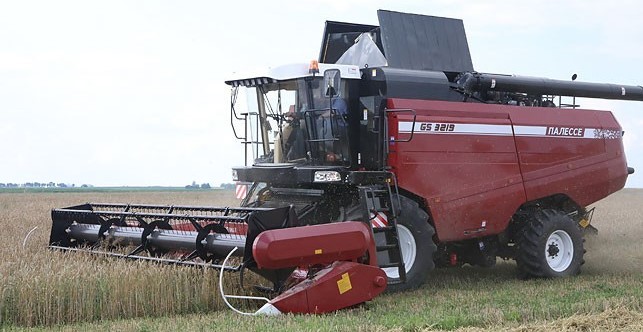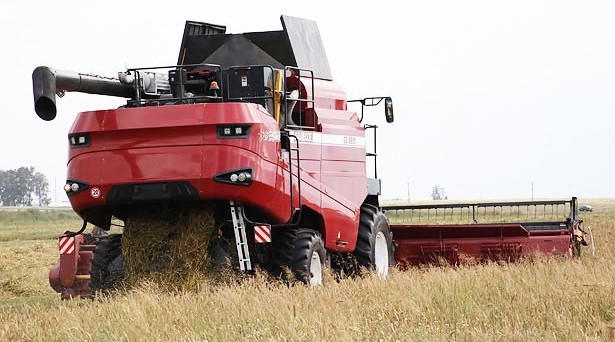Gomselmash, headquartered in the Republic of Belarus, is said to be close to launching a significantly new combine harvester.
The machine pictured above is one of the company’s existing combines – photographed at a recent trade fair.
However, the new arrival – the Palesse GS 3219 (pictured below) – is being described as a “next generation” machine. It will replace the GS 12A-1. It has 390hp at its disposal, courtesy of a 15L YaMZ (Yaroslavl Motor Works) ‘Avtodiesel’ engine.
The machine is believed to employ a two-drum threshing system, in conjunction with a rotary-type separator – though exact technical specifications have not yet been confirmed.
In any case, Gomselmash says that – during field trials – typical harvesting speeds have increased from 8kph to 10kph (compared with the existing model).
The company also points out that the new GS 3219 is home to an “upgraded and spacious cab”.
The first “commercial” batch of these harvesters is expected to leave the assembly line during the first half of this year.
Gomselmash in a nutshell
It’s worth noting that Gomselmash’s legacy stretches back over eight decades.
Also Read: Pics: ‘Unusual’ forage harvester from the ‘east’ struts its stuffThe entity now claims to have produced in excess of 2,500,000 agricultural machines, including sizeable numbers of combines and forage harvesters.
The company now exports over 90% of its production; that figure has grown rapidly from just over 72% in 2012. In that year its machines were delivered to buyers in just 10 countries; now that number has grown to 26.
Following the rationale of ‘if you want something done right, do it yourself’, most of the components for its harvesters are made in-house.
Many of Gomselmash’s machines are marketed under the ‘Palesse’ brand name; it includes grain and forage equipment – as well as even potato harvesters.
In fact, the range includes 16 different equipment lines, stretching out to over 75 different models.
Palesse-badged harvesters are currently operating in Russia, Ukraine, Kazakhstan, Czech Republic, Slovakia, Romania, Bulgaria, the Baltics, Argentina, Brazil, Iran, China and South Korea, alongside other countries.






